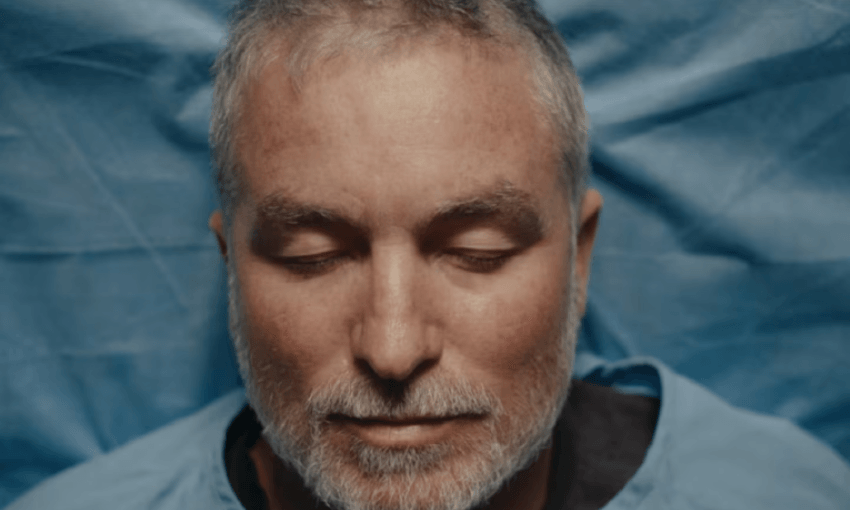Dai Henwood has been making us laugh for over 20 years. Within five minutes of Live and Let Dai, he was making us cry.
Henwood opens the first episode of his three-part series on Three in front of the camera. He sits down after awkwardly clunking into the boom mic and laughs. We then see him at the Daizen-ji Temple in Japan, writing a letter. In painstakingly slow handwritten form, the pen scrapping the parchment, Henwood is writing to himself. “You have hurt, you have loved, you have given all you could when it mattered,” he writes, sobbing throughout.
There’s an on-the-nose kind of Greek irony in Henwood, a comedian, confronting a potentially tragic fate, but in New Zealand, in lieu of poet-philosophers and highly emotional inspiration gurus, we have always relied on comedians to help us deal with the flipsides of life. We prefer to laugh first, then maybe, if the comedian is clever, inadvertently and awkwardly learn something difficult about ourselves.
Henwood held his diagnosis of stage 4 bowel cancer very close for three years but “came out”, as he says, in January 2023. Since then, he has chosen to bend the experience to his will while also surrendering to the full gamut of emotions that come with contemplating one’s mortality.
He is working on being mindful but, praise the gods of honest truth, acknowledges that it’s hard. As Henwood says, “It’s easy to be mindful when you’re a hot young influencer flogging off UV water bottles on Instagram”. Bringing it to every day life is “such is hard thing”.
His approach to living with incurable cancer, as revealed in the first episode, is fuelled by necessity, survival instinct and love of his family. He’s developed a mantra: “Optimism won’t cure me, but pessimism will kill me.”
His choice to walk this path publicly might also be part of his survival arsenal, but as we discover when Henwood’s mum, Carolyn, reads an old Mother’s Day card from Dai out loud, it’s also his natural disposition. Henwood plucks that card from a crammed shelf when he visits her in Wellington with his daughter Lucy. He is, in his own words written for his mum, “infused with a gene code of a person who knows the right thing to do”. Henwood has decided that the right thing to do is to wring out every last drop of learning from his experience and share it.
He’s also deadset on picking the bone clean in extracting as much humour from his situation as possible. He tells a group of gathered oncology specialists that he has managed to successfully crack the same joke about getting a penis reduction done five out of six times before going under the knife. Throughout the episode, we see snippets of him performing a gig at The Patriot in Devonport, Auckland. He talks about being inside an MRI machine and noting the warnings about radiation. “Is it safe?” he asks the technician. He is reassured it is as she dons “a full fucken lead suit and goes to Timaru to push the start button”.
Henwood, as he details, has had “so many MRIs” and a million needles jabbed into his body, and yet he finds a sense of wonder in the science of it all. He is amazed by it, wondering out loud, “Who thought of this?” For a man living through chemo treatments, which we witness, and which he describes in the classically understated vernacular of our land as being “pretty rugged”, Henwood is able to be amazed by a lot. He is amazed he’s sitting in front of the camera, “in good shape”. He thinks Lucy’s blue hair is amazing. He observes that humans are hard-wired to think negatively and he has honed an instinct for finding the flipside. “What if it worked out?” he asks himself.
It’s almost too easy to point out that Henwood is an all too rare example of a man who is comfortable sitting in and sharing his emotions, but we are reminded of that when he reflects on the death of his dad, Ray, in 2019. He struggled to tell his son he loved him, as so many men did and still do, and yet Henwood, as an exemplar of openly feeling things and saying those things, has gracefully accepted the knowledge that his dad did love him, even if he could not say it.
I don’t know if Henwood, director Justin Hawkes and executive producer Charlotte Hobson knew they were making important television from the outset, but important television is what they’ve made. If it takes a comedian to teach us that there is extraordinary peace to be found in living generously, with your feelings fanging out, and doing the often painful work of developing self-awareness, so be it.
Dai Henwood, the natural performer, made us laugh for 20 years. Dai Henwood, the truly graceful human, is now sharing something as necessary as laughter, but far more profound.
Episodes 1 and 2 of Live and Let Dai are available on ThreeNow; episode 3 airs tonight, October 2, on Three.
